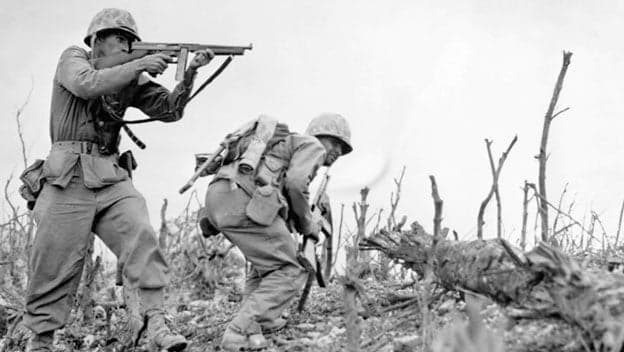On April 1, 1945, after suffering the loss of 116 planes and damage to three aircraft carriers, 50,000 U.S. combat troops, under the command of Lieutenant General Simon B. Buckner Jr., land on the southwest coast of the Japanese island of Okinawa, 350 miles south of Kyushu, the southern main island of Japan. Determined to seize Okinawa as a base of operations for the army ground and air forces for a later assault on mainland Japan, more than 1,300 ships converged on the island, finally putting ashore 50,000 combat troops.
The Americans quickly seized two airfields and advanced inland to cut the island’s waist. They battled nearly 120,000 Japanese army, militia and labor troops under the command of Lieutenant General Mitsuru Ushijima.
The Japanese surprised the American forces with a change in strategy, drawing them into the mainland rather than confronting them at the water’s edge. While Americans landed without loss of men, they would suffer more than 50,000 casualties, including more than 12,000 deaths, as the Japanese staged a desperate defense of the island, a defense that included waves of kamikaze (“divine wind”) air attacks. Eventually, these suicide raids proved counterproductive, as the Japanese finally ran out of planes and resolve, with some 4,000 finally surrendering. Japanese casualties numbered some 117,000.
Lieutenant General Buckner, son of a Civil War general, was among the casualties, killed by enemy artillery fire just three days before the Japanese surrender. Japanese General Ushijima committed ritual suicide upon defeat of his forces.
The 1952 film Okinawa starring Pat O’Brien, is one of several movies to depict this decisive episode in the history of the war.
